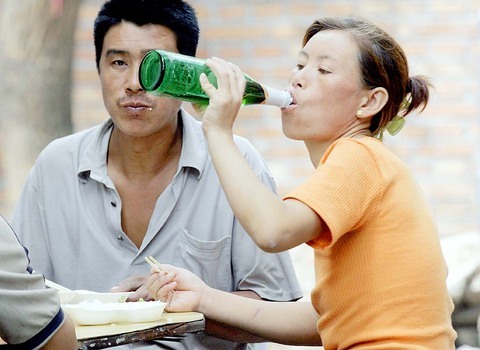China's beer industry, among the largest in the world, has defended itself against reports that 95 percent of its bottled beer contains formaldehyde, a cancer-causing agent, state media said yesterday.
Industry officials said the chemical -- commonly used to preserve dead bodies or as a disinfectant -- plays a part in the brewing process but that the level in Chinese beer is within acceptable standards, the China Daily said.
"Consumers need to know that the formaldehyde in beer is a different type from that in household chemicals, and this confusion has scared people greatly," Xiao Derun, director of the China Alcoholic Drinks Industry Association's beer branch, was quoted as saying.

PHOTO: AFP
Trouble began brewing on July 5 when the Beijing-based newspaper the Global Times printed a letter claiming to be from a beer inspector saying many Chinese breweries were using formaldehyde as an additive.
Accompanying the letter was an investigative report that quoted Du Lujun, secretary of the association's beer branch, as saying 95 percent of the country's beer contains the chemical.
According to Du, breweries use formaldehyde because it is a cheap way of preventing sediment from forming during storage, the report said.
The reports were circulated in many Chinese newspapers, alarming beer drinkers across the country.
On Monday, the Korea Food and Drug Administration said it had decided to test Chinese beer imports for formaldehyde before allowing them to clear customs, China Daily said.
Japan's health ministry has also asked importers of Chinese beers, which are increasingly popular in Japan, to check the ingredients with manufacturers to ensure they do not include formaldehyde, which Japan bans in food.
Brewers usually use silica gel, which is not hazardous, to remove unwanted substances from beer but some Chinese brewers may be using cheaper formaldehyde to cut costs, Kyodo News agency quoted Japanese government sources as saying.
Xiao said Chinese law does not ban beer from containing formaldehyde, but restricts the amount in common beer to no more than 2mg per liter, and in "organic" beer, to no more than 0.2mg per liter.
The association's annual nationwide survey found no domestic beer that exceeded the limits, Xiao added.
However, according to a China Business Times report, a 2002 survey of 19 domestic brands conducted by the National Food Quality Supervision and Inspection Center found the average formaldehyde content to be 0.31mg per liter, China Daily said.
China's major beer companies, including Tsingtao and Yanjing which account for the majority of the Chinese market, have stopped using formaldehyde in favor of other additives, it said.
Xiao added that a market survey has shown the formaldehyde content of imported beer to be similar to that of the domestically produced brew, the report said.

NATIONAL SECURITY THREAT: An official said that Guan Guan’s comments had gone beyond the threshold of free speech, as she advocated for the destruction of the ROC China-born media influencer Guan Guan’s (關關) residency permit has been revoked for repeatedly posting pro-China content that threatens national security, the National Immigration Agency said yesterday. Guan Guan has said many controversial things in her videos posted to Douyin (抖音), including “the red flag will soon be painted all over Taiwan” and “Taiwan is an inseparable part of China,” while expressing hope for expedited “reunification.” The agency received multiple reports alleging that Guan Guan had advocated for armed reunification last year. After investigating, the agency last month issued a notice requiring her to appear and account for her actions. Guan Guan appeared as required,

A strong cold air mass is expected to arrive tonight, bringing a change in weather and a drop in temperature, the Central Weather Administration (CWA) said. The coldest time would be early on Thursday morning, with temperatures in some areas dipping as low as 8°C, it said. Daytime highs yesterday were 22°C to 24°C in northern and eastern Taiwan, and about 25°C to 28°C in the central and southern regions, it said. However, nighttime lows would dip to about 15°C to 16°C in central and northern Taiwan as well as the northeast, and 17°C to 19°C elsewhere, it said. Tropical Storm Nokaen, currently

‘NATO-PLUS’: ‘Our strategic partners in the Indo-Pacific are facing increasing aggression by the Chinese Communist Party,’ US Representative Rob Wittman said The US House of Representatives on Monday released its version of the Consolidated Appropriations Act, which includes US$1.15 billion to support security cooperation with Taiwan. The omnibus act, covering US$1.2 trillion of spending, allocates US$1 billion for the Taiwan Security Cooperation Initiative, as well as US$150 million for the replacement of defense articles and reimbursement of defense services provided to Taiwan. The fund allocations were based on the US National Defense Authorization Act for fiscal 2026 that was passed by the US Congress last month and authorized up to US$1 billion to the US Defense Security Cooperation Agency in support of the

PAPERS, PLEASE: The gang exploited the high value of the passports, selling them at inflated prices to Chinese buyers, who would treat them as ‘invisibility cloaks’ The Yilan District Court has handed four members of a syndicate prison terms ranging from one year and two months to two years and two months for their involvement in a scheme to purchase Taiwanese passports and resell them abroad at a massive markup. A Chinese human smuggling syndicate purchased Taiwanese passports through local criminal networks, exploiting the passports’ visa-free travel privileges to turn a profit of more than 20 times the original price, the court said. Such criminal organizations enable people to impersonate Taiwanese when entering and exiting Taiwan and other countries, undermining social order and the credibility of the nation’s